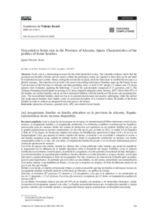Abstract.
Foster care is a determining resource for the child protection system. The scientific evidence shows that the psychosocial benefits of foster care for minors within the protection system are superior to those that can be provided by residential resource centres. Hence, during the last decade in Spain, work has been done to establish foster care as a priority resource. The objective of our work is focused on describing what type of families make up the Family Foster Care resource of the Province of Alicante and their parenting styles. A total of 207 people (72 minors and 132 foster parents) were evaluated, applying the following: 1) an ad hoc questionnaire composed of 12 questions; and 2) The Alabama Parenting Questionnaire consisting of 42 items (Spanish adaptation from Servera, 2007). More than 50% of the families are nuclear families and do not have biological children, with the duration of the foster care exceeding two years. The reconstituted families stand out due to its parental involvement and positive upbringing, while the nuclear and single-parent families show higher scores in consistent discipline. It is essential to know the profile of the foster families in order to achieve an adequate foster care process for minors.

